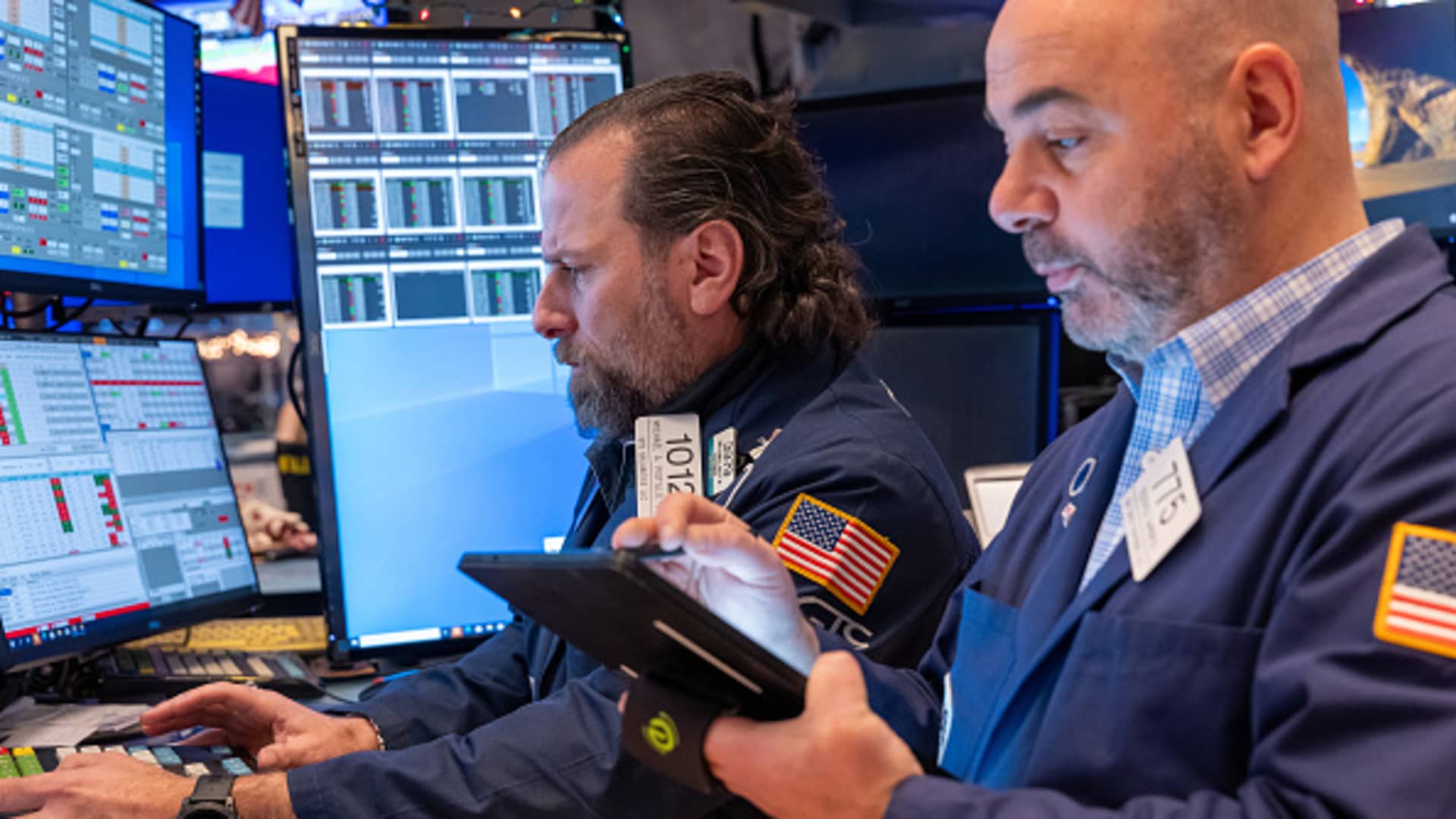Traders work on the floor of the New York Stock Exchange (NYSE) on the first trading day of 2024 on January 02, 2024 in New York City.
Spencer Platt | Getty Images
This report is from today’s CNBC Daily Open, our new, international markets newsletter. CNBC Daily Open brings investors up to speed on everything they need to know, no matter where they are. Like what you see? You can subscribe here.
What you need to know today
First day jitters
U.S. markets mostly fell on 2024’s first day of trading, with the Nasdaq Composite having its worst day since October. Meanwhile, U.S. Treasury yields climbed. Europe’s Stoxx 600 index fell 0.11%, erasing gains of nearly 0.7% earlier in the day, as data showed the euro zone’s factory activity shrank in December.
Tesla delivers
Elon Musk’s electric-vehicle company Tesla reported 484,507 deliveries for the fourth quarter, bringing its total annual deliveries for 2023 to 1,808,581. That’s a 38% year-over-year growth, and just about meets Tesla executives’ target of 1.8 million deliveries stated during the company’s last earnings call in October 2023.
Apple falls
Apple shares fell 3.58% after Barclays downgraded the stock to underweight. Furthermore, the bank trimmed its price target for Apple from $161 to $160. Barclays analyst Tim Long wrote in a note to clients that Apple’s iPhone 15 sales were “lackluster,” especially in China, a weakness that Long believes will extend to the rest of Apple’s product lines.
Extended shipping detour
Maersk will pause all shipping through the Red Sea and Gulf of Aden until further notice, the company announced, after one of its vessels was attacked by Houthi militants based in Yemen over the weekend. The Danish shipping giant’s decision highlights how the U.S.-led initiative to safeguard passage in that area, called Operation Prosperity Guardian, is facing challenges. Oil prices fell Tuesday.
[PRO] Where’s the S&P headed?
The S&P 500 ended 2023 more than 20% higher. What happens after that? CNBC Pro’s Bob Pisani looks at historical data to find out how likely it is for the S&P to continue its upward streak in 2024 — and if the index can repeat its stellar performance twice in a row.
The bottom line
It wasn’t the upbeat start to the new year that investors had hoped for.
The 10-year U.S. Treasury yield added around 8 basis points to 3.941%, approaching the 4% level again, while the 2-year yield was more than 7 basis points higher at 4.324%.
That put pressure on stocks. The S&P 500 lost 0.57%, dashing hopes of a new closing high to start the new trading year, while the Nasdaq Composite retreated 1.63%, its worst showing since October.
The tech-heavy index was weighed down as several major stocks fell. Apple shares suffered after Barclays downgraded the company, causing other Magnificent Seven stocks to slip in sympathy. The iShares Semiconductor ETF dropped 3.6%.
Meanwhile, shares of Rivian slumped more than 10% on news that the electric-vehicle company delivered about 10% fewer vehicles in the fourth quarter compared with the previous period.
Still, it wasn’t all bad news yesterday.
The Dow Jones Industrial Average managed to hold its ground, eking out marginal gains. And shares of Moderna popped 13.12% after Oppenheimer said the Covid vaccine maker could launch several new products over the next 12 to 18 months.
Bitcoin, meanwhile, traded above the $45,000 barrier for the first time since April 2022, adding to its sharp gains of more than 170% over the past 12 months.
The long-term view for stocks still looks bright, according to several analysts.
The Nasdaq could hit 20,000 in 2024 because of an “AI monetization cycle,” according to Wedbush Securities’ Dan Ives. Separately, Scott Rubner, managing director at Goldman Sachs, noted that stocks only saw $172 billion in inflows last year — the lowest since 2019 — implying there’s more money on the sidelines to pump up stock prices this year.
There’s also the first interest rate cut to look forward to, which has historically helped stocks “rally for 6-7 months with a mean gain of roughly 12%,” wrote Joe Kalish, chief global macro strategist at Ned Davis Research.
Investors shouldn’t be discouraged by a disappointing start to the new year. A slow beginning, perhaps, but the year still holds promise.
Correction: This report has been updated to correct the country in which Maersk is based.
